#the Fall of Man
Text


#personal#aesthetic#dark#goth#gothic#art#gustave dore#daily#the frenzy of roland#paradise lost#the fall of man#fallen angel#black and white#religious#spiritual
60 notes
·
View notes
Text
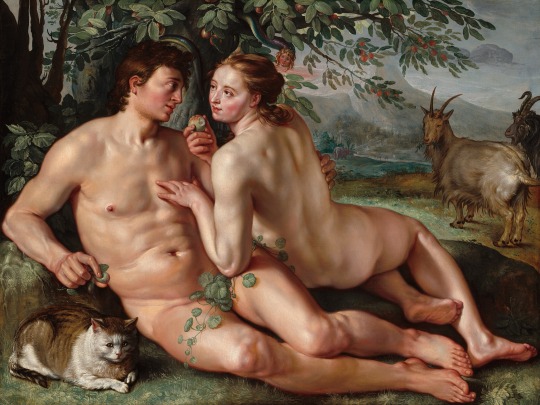
The Fall of Man (1616, oil on canvas) | Hendrik Goltzius
233 notes
·
View notes
Text




THE FALL OF MAN /1592/ by CORNELIS VAN HAARLEM
The painting represents the biblical story of Adam and Eve being expelled from the garden of Eden, where Eve, is tempted by the serpent, and she passes the forbidden fruit to Adam, who hesitantly extends his hand. This scene captures the story of original sin by showing the consequences of disobedience.
In the background, God is depicted as a cloud with human features, warning Adam and Eve against eating from the tree of knowledge. In biblical literature, clouds have typically been used to symbolize divine presence and glory. Here, the cloud represents God's innate supremacy, showing that God is above and beyond human understanding.
The serpent depicted here is with a human torso and female features conveying a more insidious and seductive nature, which makes the whole temptation scenario uniquely interesting. The choice could be a deeper meaning into the gender roles and the nature of sin within biblical context.
The variety of animals in the painting symbolize innocence and the harmony of creation before the fall. They emphasize the loss of paradise with the ruined natural order caused by human transgression. Moreover, the contrast of the greenery (the lush Garden of Eden) against the impending doom of the actions of Adam and Eve creates a visually striking narrative.
70 notes
·
View notes
Text
If I had a nickel for every time a folk band I adored released an album meant to be listened to in order, which tells the story of the fall of man/ a prodigal son character (one of them is both), started with man being close to God then followed his journey of rejecting him, realizing his life was empty without him, and eventually returning back to God, had consistent themes and motifs woven through it, and ended with a reprise of the first song to represent the restoration of fellowship,
I'd only have two nickels

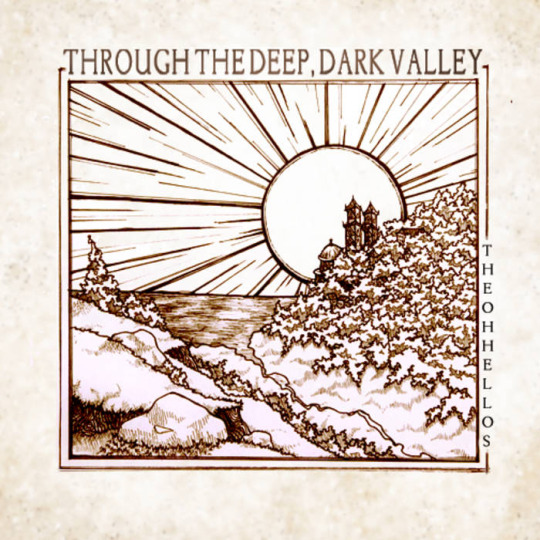
but it is weird that it happened twice
#like technically principium is only about Adam and Eve#and Through the Deep Dark Valley is mostly about a prodigal son figure and only kind of about Adam and Eve#BUTTTT#the point still stands#and based off of 'Like the Dawn' it is atleast partially about Adam and Eve#probably way too niche of a post but whatever#the similarities are fascinating#also STRONG recommend for both of these albums they are incredible#the oh hellos#through the deep dark valley#The Oh Hellos band#the arcadian wild#Principium#Principium The Arcadian Wild#song#song post#christian#the fall of man
57 notes
·
View notes
Text
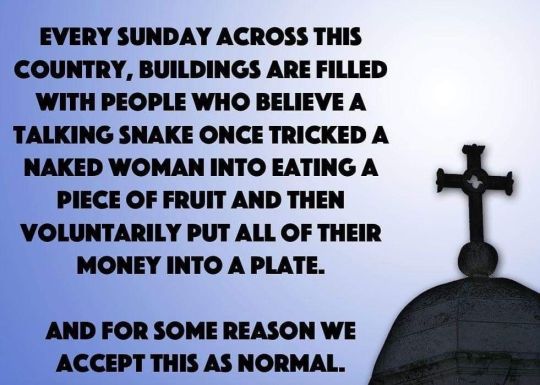
"Every Sunday across this country, buildings are filled with people who believe a talking snake once tricked a naked woman into eating a piece of fruit and then voluntarily put all of their money into a plate.
And for some reason we accept this as normal."
#christianity#the fall#the fall of man#garden of eden#the garden of eden#bible#bible study#tithing#religion#religion is a mental illness
58 notes
·
View notes
Text

Oh to be a round cat in a renaissance painting
.
from The Fall of Man by Hendrick Goltzius c. 1616
#my photo#art#artwork#not my art#cat art#cat#renaissance#renaissance art#renaissance painting#adam and eve#the fall of man#hendrick goltzius#national gallery of art#washington dc
5 notes
·
View notes
Text
The Fall, Transgression, and the Symbolism of Mortality
Recently in my religion class my professor taught a lesson that completely changed the way I see the story of the Fall. We're all familiar with Eve making choice to transgress and allow her and Adam to live up to their fullest potential, despite the risks. Once I came to that realization a few years back, I hadn't given the story much more introspection outside of this general idea.
He first had us consider the definition of transgression as the crossing of a boundary or threshold. In the Garden when they partook, they transgressed from a state of immortality to a state of mortality. This is a neutral act in its own right. But what of God's command not to partake? Wouldn't disobeying this be a sin? This is when he shared the following quote (parentheses added by the teacher):
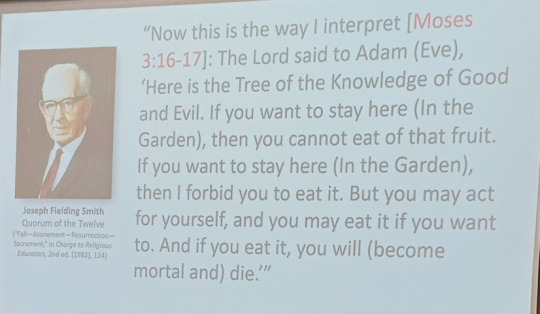
This recontextualizes the whole act. The serpent tempting Eve wasn't just God allowing opposition, it allowed Eve to think on the consequences and benefits of mortality and come to her decision. They were cast out of the Garden not as punishment, but as part of the established terms and conditions of becoming mortal. God did not place them in a catch-22 where the only way to follow one command (i.e. to have children) was to disobey another (not eating the fruit). He gave them two situations, both with consequences, and gave them agency to choose.
Next is the symbolism of the two trees in the Garden, and their role. There is the Tree of the Knowledge of Good and Evil, and the Tree of Life. Eve partook from the former, and a cherubim with a flaming sword came to guard the latter once they had been cast out to ensure they didn't partake and gain immortality in a fallen, mortal state.
(To clarify, they aren't fallen because of a sin, they are fallen because they are mortal, with flaws and the ability to be beset by things that aren't of God. The nature of humanity is not innately wicked, we are all born with the light of Christ, and this is so often disregarded in other branches of Christianity as well as in the Church itself, and I feel it is something that should not be forgotten, but that is a discussion for another time).
Now, considering the two trees, they can represent Adam and Eve, and the roles they had in mortality. The Tree of Knowledge allows for mortality- it is like Eve giving life to all of the world through her choice and giving birth. The Tree of Life allow us to come back to the presence of God and be born again- like the ordinances of the Priesthood that Adam would give to his children. Women give us the first birth through the power of the priesthood (because the ability to literally part the veil and bring a child into the world is absolutely a priesthood power [also, the ability of women to use their priesthood keys that are given to them over their stewardship is yet another separate discussion I won't be getting into now for the sake of brevity]) and men give us our second birth through the priesthood ordinances God has entrusted them with. In this, men and women are both equal parts of Salvation.
The cherubim and the flaming sword can be seen as leaders such as bishops and stake presidents that make sure the people don't participate in ordinances unworthily or without knowing what they're getting in to. While these leaders may have individual flaws, (again, we're all mortal and can choose how much we want to actually listen to God) the idea behind it is protecting those who aren't ready to commit to the covenants or be lifted up to a different state, which is also fascinating food for thought.
Now, my teacher was sure to point out the this is not the sole purpose of men and women, we have lives and roles and desires outside of this, it's just a symbolic way to look at the equal partnership of men and women in the role of salvation, and why both Adam and Eve were vital in the context of mortality and the Fall.
TL;DR, the Fall wasn't a sin but a choice God presented that has been misconstrued, and the two trees in the Garden represent the role of men and women in the birth and rebirth of our spirits during mortality that are both vital and come from the priesthood.
52 notes
·
View notes
Text
Whilst I love the His Dark Material books, I do appreciate the show for explaining the parts of the book that I always found a bit difficult to wrap my head around: namely the prophecy and what Lyra being the second "Eve" meant.
It's hard for me to voice exactly my opinions on the original story of Adam and Eve, given I was not raised Christian and only told the basic outlines of the bible (Adam and Eve, birth and death of Jesus etc) from my primary school days at a Church of England school.
But from what I understand, Eve was the cause of "original sin/fall of man". I am purely fascinated by what exactly this means, as I can't seem to find a solid answer anywhere; but HDM (or rather the author, Philip Pullman) attempts to explain "the fall" as becoming aware of knowledge, love, and experience. Things that are associated with growing up, and moving away from childhood innocence. This was (in my opinion) quite vague in the books, so the show adds some commentary about it that I appreciate:
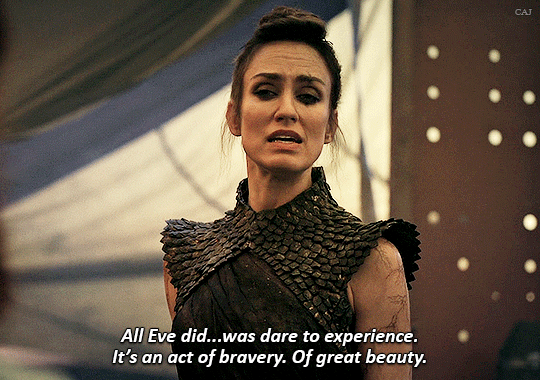
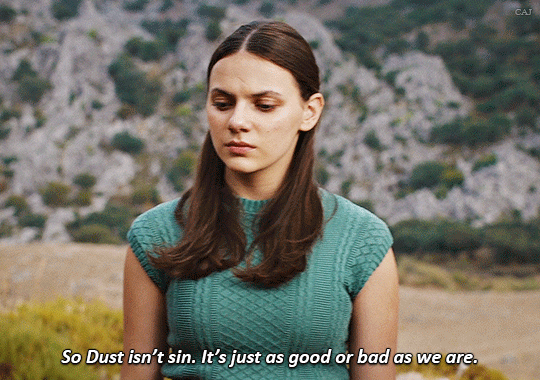
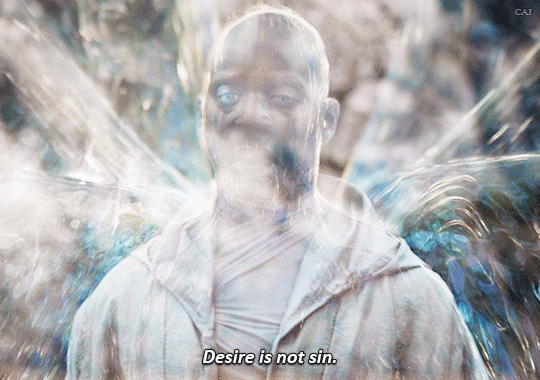
So that's it. Lyra as Eve is doing what her predecessor did: was tempted to experience all the good and bad that makes us human.
I'm also curious as to how Adam fit into this - Was he tempted as well, or did he follow Eve into "sin" because he wanted to remain faithful to her? Were they really like children until they became aware of everything g thanks to the fruit? Was it all a good or bad thing?
#I guess this whole post is 'please help me understand what these stories are about before I lose my head'#I'm genuinely curious#I don't wish to sound ignorant - on the contrary that's why I'm asking to know more#feel free to add to this#his dark materials#hdm#lyra belacqua#lyra silvertongue#the fall of man#eve#the second eve#hdm spoilers
12 notes
·
View notes
Text
I'm slowly learning that there was an entire category of website that was demonized in the 2010s just because dudes online couldn't handle women being horny on main
#my egg cracking has had farther reaching implications than i thought#i never thought i'd be on tumblr#and i never thought i'd consider browsing ao3#yet here i am#personal stuff#the fall of man
4 notes
·
View notes
Link
Our Podcast is now available for you to listen to online. Join us as we rediscover hidden secrets inspired by the holy word of God. Please Like, Share and Subscribe. Leave your comments or questions below. Join us on Facebook at: send forth your word
#Understanding Good and Evil#the fall of man#the tree of good and evil#tree of life#serpent in the Garden#adam and eve#yahavah#holy bible#holy spirit
2 notes
·
View notes
Text
The essence of sin is that it separates a man from God. When Adam, in the old story, committed the first sin, his first instinct was to hide himself from God. The man who dies in sin dies at enmity with God; the man who accepts Christ already walks with God, [as Adam did before the Fall,] and death only opens the way to a closer walk. To refuse Christ is to be a stranger to God; to accept him is to be the friend of God, and in that friendship the fear of death is for ever banished.
William Barclay
#william barclay#Adam#the fall of man#Sin#the afterlife#Death#friendship with god#a vital warning#jesus christ
6 notes
·
View notes
Text
"Epic Majesty: John Milton's 'Paradise Lost' and the Theological Tapestry of the Human Condition"

John Milton's "Paradise Lost" stands as an unparalleled epic that delves into the cosmic realms of theology, morality, and the human experience. Published in 1667, this monumental work continues to resonate across centuries, offering readers an expansive canvas upon which the grand tapestry of creation, rebellion, and redemption unfolds. The title itself evokes the poignant irony of a paradise lost and the intricate theological explorations that define Milton's magnum opus.
The narrative centers on the biblical tale of the Fall of Man, tracing the events from Satan's rebellion in Heaven to Adam and Eve's expulsion from the Garden of Eden. Milton's blank verse is a majestic river of language, a flowing current that navigates through the celestial and terrestrial landscapes with a divine eloquence. The poetic richness and rhythmic cadence of Milton's verses contribute to the epic grandeur of the work, elevating it to the status of one of the greatest literary achievements in the English language.
At the heart of "Paradise Lost" lies the enigmatic figure of Satan, a rebellious angel whose defiance of God sets in motion the cosmic drama. Milton's portrayal of Satan is complex and multifaceted, challenging readers to grapple with questions of free will, pride, and the nature of evil. The character of Satan becomes a tragic figure, a charismatic and flawed entity whose rebellion is fueled by a misguided sense of autonomy.
Milton's exploration of Adam and Eve, the first human couple, adds another layer to the theological discourse. Their innocence, fallibility, and subsequent expulsion from Eden become symbolic of the broader human experience—caught between the desire for knowledge and the consequences of disobedience. The interplay between free will, temptation, and the inevitability of divine judgment forms the thematic backbone of the narrative.
"Paradise Lost" also engages with profound theological questions, reflecting Milton's own Puritan convictions and his dissent against the hierarchical structure of the Church of England. The work contemplates the nature of God, the problem of evil, and the redemptive power of divine grace. Milton's theological stance, however, remains dynamic, allowing for diverse interpretations and sparking scholarly debates on the nuances of his religious beliefs.
The epic's enduring appeal lies not only in its theological depth but also in its universal themes that transcend religious boundaries. Milton's exploration of the human condition—its aspirations, flaws, and the perennial struggle between good and evil—resonates with readers across cultures and time periods. "Paradise Lost" serves as a testament to the enduring power of literature to grapple with fundamental questions of existence.
In conclusion, John Milton's "Paradise Lost" is a literary colossus that stands at the intersection of theology, philosophy, and literature. The title encapsulates the essence of the narrative—an epic portrayal of the cosmic struggle between divine order and human agency. Milton's poetic brilliance and profound exploration of theological themes ensure that "Paradise Lost" remains an ever-relevant masterpiece that invites readers to ponder the complexities of the human condition and the timeless quest for meaning in a world marked by both paradise and loss.
John Milton's "Paradise Lost" is available in Amazon in paperback 16.99$ and hardcover 24.99$ editions.
Number of pages: 469
Language: English
Rating: 9/10
Link of the book!
Review By: King's Cat
#John Milton#Paradise Lost#The Fall of Man#Theological epic#Biblical narrative#Cosmic drama#Blank verse#Grand tapestry#Creation#Rebellion#Redemption#Biblical tale#Satan#Divine eloquence#Epic grandeur#Literary achievement#English language#Free will#Pride#Nature of evil#Tragic figure#Charismatic#Flawed#Autonomy#Adam and Eve#Garden of Eden#First human couple#Human experience#Desire for knowledge#Consequences of disobedience
5 notes
·
View notes
Text
youtube
In the end, the fall was her choice. A choice for knowledge over blind faith.
My first finished animatic... for an english final. Why I did this to myself, idk.
i will rant about my artistic choices if provoked
#paradise lost#eve#the fall of man#my art#animatic#this was one of those “finished at 2am” things#but overall i'm pretty proud of it#Youtube
2 notes
·
View notes
Text

"Right from the beginning the bible teaches that God has never had any trust or 'faith' in humanity. If he did, he would have created humans with knowledge and trusted us to make good decisions. Instead he put knowledge out of our reach and made it a crime to seek it.
Why have faith in something that has obviously never had faith in you?"
Why do you worship a god who openly despises its own creations?
#christianity#religion#bible#bible study#adam and eve#adam & eve#creation myth#the fall of man#fall of man#the tree of knowledge of good and evil#the tree of knowledge#adam and eve myth#religion is a mental illness
76 notes
·
View notes
Text
All right, this is what I need yall to do:
-if you are a man or man-like entity: fall.
-you can get back up if you want but frankly I would not recommend it
-optional: run headlong at the next man you see, preferably crying, "hark! The man has fallen!"
-encourage the men around you to fall in solidarity with you also
Remember: the more men that fall, the more vitamin C become impregnated into the earth.
Good luck!!
8 notes
·
View notes
